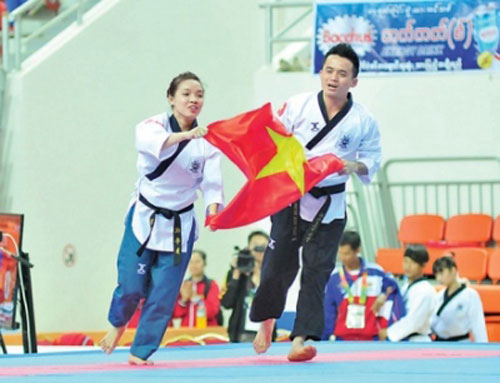
Vietnamese sport has asserted its commanding position on the SEA Games arena.
The Vietnam sporting contingent has achieved the main objectives set prior to their departure for the 27th SEA Games, finishing third overall with 73 gold, 86 silver and 86 bronze medals. Earning a podium finish in six consecutive SEA Games seasons is a convincing declaration of the commanding position of Vietnamese athletics on the regional stage.
Those regional results, however, seem to bear little connection with larger arenas such as the Asian Games (Asiad) or the Olympic Games, says Nguyen Hong Minh, former head of the High Performance Sports Department. At recent continental and international sporting events, Vietnam has struggled to turn in better performances, even returning empty-handed several times, while other regional opponents, including Singapore, Indonesia and Malaysia, have harvested certain successes.
The SEA Games medals no longer symbolise true sportsmanship and fair play, as disputes arise over the so-called ‘privileges’ of the host nation whenever the Games are held. Unjust tears from those deprived of glories and the hosts’ unfair treatment in terms of competition curricula, organisational work and referees, are gradually turning the region’s largest sporting event into nothing more than a ‘local festival’.
The burden of regional achievements has become a big obstacle as the national team strives to adapt to those distinctive requests instead of paying attention to obtaining true values on its way of development.
Was it worth it to see Quach Thi Lan faint from exhaustion on the women’s 400m hurdles, or female boxer Nguyen Thi Chinh continue her competition despite injuries when they did not always receive appropriate rewards? Is it reasonable that the incentive for those noble athletes is usually so small compared to that of the men’s football team – the team that creates the most anticipation but also causes continual disappointments?
Vietnam sport fans have been waiting a long time for the country to succeed at the Asian Games or the Olympic Games, and for an athlete to conquer the glory won by taekwondo artist Tran Hieu Ngan (silver, Olympics 2000) and weightlifter Hoang Anh Tuan (silver, Olympics 2008).
Despite the knowledge that every medal won is the result of the athlete’s hard work, it seems that Nguyen Thi Anh Vien, Nguyen Hoang Ngan, Nguyen Thi Thanh Phuc and other outstanding Vietnamese athletes are wasting their time and efforts in contests which are gradually losing their meaning.
Unless timely adjustments are made, Vietnam sport will never escape from the ‘regional slough’ to get prepared for the 17th Asiad in the Republic of Korea this year or the 18th Asiad to be hosted in Vietnam in five years’ time; events which spare no place for the ‘special sports’ of host localities.
Vietnam sports fans are now no longer anticipating each SEA Games gold medal like they did in the opening days of regional integration. What they are really waiting for is the moment the national flag flies proudly on continental and world arenas following the success achieved by the country’s prominent athletes.
It is the right time for necessary changes to be made, in thought first and then in action to realise those high-flying aspirations. Positive signals have already come out in the beginning stages, especially in two staple Olympic sports – athletics and swimming. Vietnam currently possesses a generation of promising young talents, with many pillars of the athletics and swimming teams aged between 19-20.
Vietnam sport has been shifting back to a mainstream orbit, with mainstream paths to reap success based on the root consolidation. Maybe we will obtain fewer SEA Games achievements but we may welcome more valuable results.
Head of the General Department of Sports and Physical Training Vuong Bich Thang
Alongside focusing its long-term investment in 10 sports of group 1 for the Asiad goal, the sport sector will work to identify three to five spearhead sports to prepare for the Olympics. This spearhead group will receive prioritised investment with breakthroughs in the implementation process.
Preparations have been going ahead for the 2014 Asiad, 2016 Olympics and the 2019 Asiad, which is to be hosted by Vietnam for the first time ever.